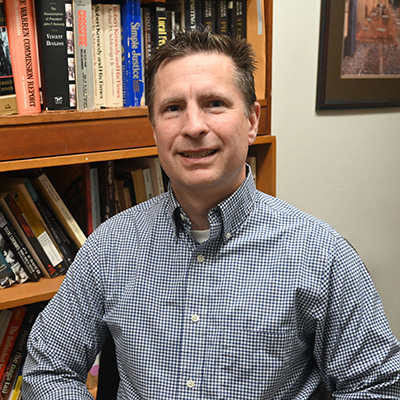
Eric Juhnke
It isn’t precisely correct to say that being a history professor is a family business, but Briar Cliff University Political Science Professor Eric Juhnke is one of three such professors in just two generations of his family.
Juhnke earned his undergraduate degree from Graceland College in Lamoni, Iowa, where he took a half dozen courses from his father, History Professor Bill Juhnke. An uncle is also a history professor, and Bill Juhnke has come a few times to the The Cliff to give a lecture in his son’s class.
“I always knew that being a history professor was a very real occupation. I wouldn’t have gone into it if I didn’t see it was good for their lives,” Eric Juhnke said.
Juhnke is chair of the History & Political Science Department, a position he has held for a combined 12 years over two stints. He also is the BCU Honors Program Director. He has a master’s degree from the University of Northern Iowa and a Doctorate in History from the University of Kansas.
In 2000, Juhnke was a lecturer at Missouri State University, then arrived at Briar Cliff in the fall 2001 semester. BCU was on a trimester system then, with a later starting date to the academic year, so his first full week notably included the 9-11 terrorist attacks day.
Juhnke said that remains a vivid memory: “We talked about it in class. It took over everything.”
He is the author of the book Quacks & Crusaders published in 2002. The subject matter involves three men who were charlatans in the medical field. In pushing their supposed cures, the crusading quacks used a lot of populist rhetoric, which overlaps with a lot of political messaging, Juhnke added.
The department has one other full-time professor, Amy Boland. Three other BCU professors in other departments teach some courses within the History & Political Science realm, and some adjunct instructors are periodically incorporated into the teaching team. Juhnke’s expertise is in American History, with specialties in the twentieth-century U.S., the social history of medicine, African American history, and popular culture. Boland focuses on European and World History, so he said they make a well-rounded team.
Unlike many career-oriented disciplines such as kinesiology, criminal justice, or nursing, history is a skills-based subject, Juhnke said.
“We explore many skills, like critical thinking, writing skills, teamwork, and collaboration. History is a good foundational program,” he said. “The average person changes careers five to seven times over their lifetime. The skills learned in studying history give our graduates flexibility in the job market because they are transferable and valued by various professions.
There are usually 20 students with history majors most years, with about half aiming to be secondary school history teachers. Some are political science minors, and others take the history/law track, where nine history classes and five legal courses are offered for BCU students who plan to head to law school. Many more BCU students take a history course or two for their general education.
Beyond that, history on the Briar Cliff campus gets exposure in other ways that students have enjoyed. The popular History Club, which has participating students who are majoring in the field and those who do not, gives the opportunity to watch movies like “42” about the life of Jackie Robinson, who notably broke the Major League Baseball color barrier, and “JoJo Rabbit,” an off-kilter take on the life of Adolf Hitler. In February, the club had a well-attended trivia night, and one other in-demand facet is a trip to Europe every few years.
The most recent Europe trip was in June 2023, when Juhnke said 15 BCU students explored some nations and widened their horizons in history, geography, and culture. Some stops included London, Paris, and Rome, plus the notable World War II battle spot of Normandy Beach.
“They always love London; they always love Paris,” said Juhnke, who has led six European trips over two decades.
This is part of a series of Faculty Stories profiling all the chairs of BCU academic departments in 2023.